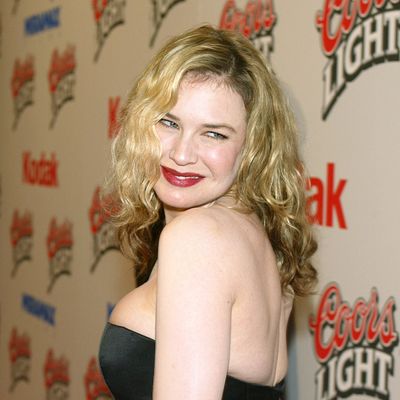
More than any other actress of her generation, Renée Zellweger’s face has been used as shorthand for her career. In an industry where every female star’s face is fodder for public comment, Zellweger has undergone the worst of it — ever since she gained weight for Bridget Jones’s Diary (and lost it for Chicago), Zellweger’s been too fat, too thin, too Botoxed, too something. On the occasion of the latest controversy, let’s take a look back at all the ways Zellweger’s features have disappointed her ostensible fans.
2001
The public furor over Zellweger’s looks began when she gained 20 pounds to play Bridget Jones. Suddenly her figure was fair game; all the usual subtextual concerns about actresses’ bodies were allowed to become text. It was not a happy time for her. “I realized the influence of living in a society that focuses so much on physicality has affected me,” she told Vogue years later. “When the film was coming out, the question I was asked the most was regarding my weight. … I was followed around Heathrow by a guy who wanted to take a picture of my backside. I don’t understand the obsession.”
2002
The concern trolling rose to new heights once Zellweger began dropping her Bridget Jones weight for Chicago. The Daily Mail’s Femail section called her “shockingly gaunt” and quoted a nutritionist who called the weight loss “very worrying” and “potentially dangerous.” Zellweger herself waved off the claims, telling Vogue she was just “a busy girl who takes care of herself.”
2003
With weight covered, the press soon moved on to the next logical step: plastic surgery. During the 2003 awards season, focus shifted to Zellweger’s lips. Had she injected them with collagen, or was it just powerful lipstick? It got bad enough that she was forced to deny the rumors during a Guardian profile. “My signature thing is not Poster Girl Renée, anyway,” she told writer Zoe Williams.
2005
As with her Cold Mountain co-star Nicole Kidman, the Botox rumors began flying around Zellweger in the mid-aughts. This was around the time her face began showing up on plastic-surgery blogs, which pointed to “the difference in the arch in her eyebrows” as evidence she’d had work done. Meaner people just made jokes about lemons.
2007
A selection of phrases from the Daily Mail story, “Has Ruddy-Faced Renée Zellweger Taken Beauty Treatments Too Far?”: “ruddy raw cheeks,” “overdoing it in her quest for younger-looking skin,” “harsh beauty routine,” “facial sandblasting,” “tender-looking skin.”
2009
With the release of New in Town and My One and Only, journalists started to take Zellweger’s new appearance as a personal affront. “Her pursed lips, pinched expressions and icepick chin no longer shout out ‘warm and cuddly,’” wrote the New York Daily News’ Joe Neumaier, while Page Six’s Jarrett Wieselman complained, “I watched the woman I fell in love with slowly vanish. Literally and figuratively.”
2010
In a long post on the possibility of a professional comeback for the actress, Pajiba went hard on the topic of Zellweger’s changing looks, taking aim at “her newfound alien-like qualities.” As the site’s Agent Bedhead wrote, “No longer does she possess a girl-next-door appeal in either attitude or appearance — recent pictures highlight a face that’s been destroyed.”
2013
A selection of phrases from the Daily Mail story “’What Has Happened to Renée Zellweger?!! Botox Overdose?’ Academy Awards Viewers Startled by Star’s Youthful Look”: “suspiciously smooth complexion,” “incredibly wrinkle-free face,” “extremely toned arms,” “people focused more on her face rather than her stunning gown.”
2014
With her appearance at Elle’s Women in Hollywood event, Zellweger’s face became a full-on trending topic. The Mirror got a plastic surgeon to diagnose her efforts (saying she’d likely had something called a “blepharoplasty”), and Gawker simply published a collection of images under the headline “Here Are Some Pictures of Renée Zellweger,” no jokes needed. Fortunately, Zellweger had a defense that was missing in 2003 — think piece culture, which soon went to work on essays defending the star. A selection of headlines: “What’s Really Behind the Ridicule of Renée Zellweger’s Face,” “Renée Zellweger’s Face Is Too Real,” and “Yes, Those Pictures of Renée Zellweger Are Disturbing. But Why?”
2016
The recent trailer for Bridget Jones’s Baby has heralded fresh consideration of Zellweger’s face. The Mirror crowed in a headline, “Bridget Jones is that you? Renée Zellweger’s transformation leaves Mr. Darcy’s lover unrecognisable in new trailer,” with other blogs more demurely exclaiming, “Renee Zellweger looks so different in the Bridget Jones’s Baby trailer!” Most prominent, though, is Variety film critic Owen Gleiberman’s attempt to mask his horror over her changed appearance with a critical argument about filmmaking. “I thought: She doesn’t look like Bridget Jones!” Gleiberman writes. “Celebrities, like anyone else, have the right to look however they want, but the characters they play become part of us. I suddenly felt like something had been taken away.” You’ve ruined his moviegoing experience, Renée! Gleiberman writes, “I just hope it turns out to be a movie that stars Renée Zellweger rather than a victim of ‘Invasion of the Face Snatchers.’”

